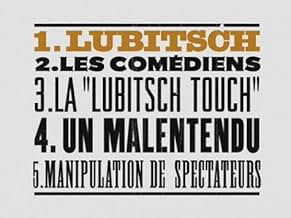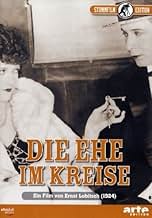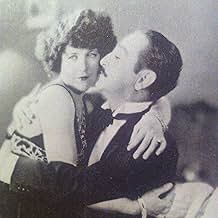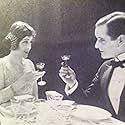IMDb RATING
7.0/10
1.6K
YOUR RATING
Professor Stock and his wife Mizzi are always bickering. Mizzi tries to seduce Dr. Franz Braun, the new husband of her good friend Charlotte.Professor Stock and his wife Mizzi are always bickering. Mizzi tries to seduce Dr. Franz Braun, the new husband of her good friend Charlotte.Professor Stock and his wife Mizzi are always bickering. Mizzi tries to seduce Dr. Franz Braun, the new husband of her good friend Charlotte.
- Awards
- 2 wins total
- Director
- Writers
- All cast & crew
- Production, box office & more at IMDbPro
Featured reviews
Professor Stock (Adolph Menjou) and wife Mizzi (Marie Provost) have reached an impasse in their marriage and he wants out. Mizzi's best friend Charlotte ( Florence Vidor ) is blissfully married to Dr. Charles Braun (Monte Blue). His partner Dr. Mueller (Creighton Hale) has designs on Charlotte who has no interest. When Mizzi sets her sights on Dr. Braun suspicions, stoked by misinterpretation and the diabolical Mizzi arise and accusations fly.
The Marriage Circle is an excellent comedy of errors from the Silent Era featuring the wit and sophistication of Ernst Lubitsch that would go on to brilliantly inform some of the finest adult comedies before and after sound and code enforcement. Here he breezily unfolds his story with a benign amorality and suspense as his quintet of characters all share a little guilt and selfishness.
Vidor is a beauty and paragon of virtue to behold but capable of being petty. Blue and Hale comically pine and mope while Menjou is pure dinner at eight collected. Acting honors however belong to Provost's Mizzi whose side glances and brashness haul the rest of the characters into the circle.
The Marriage Circle is an outstanding example of silent film comedy and in large contrast to the slapstick that still dominated. Doors are closed, not slammed or run through, the humor is sly not pie in the face. Lubitsch conveys it beautifully here as he would into sound as well as influence a generation of filmmakers.
The Marriage Circle is an excellent comedy of errors from the Silent Era featuring the wit and sophistication of Ernst Lubitsch that would go on to brilliantly inform some of the finest adult comedies before and after sound and code enforcement. Here he breezily unfolds his story with a benign amorality and suspense as his quintet of characters all share a little guilt and selfishness.
Vidor is a beauty and paragon of virtue to behold but capable of being petty. Blue and Hale comically pine and mope while Menjou is pure dinner at eight collected. Acting honors however belong to Provost's Mizzi whose side glances and brashness haul the rest of the characters into the circle.
The Marriage Circle is an outstanding example of silent film comedy and in large contrast to the slapstick that still dominated. Doors are closed, not slammed or run through, the humor is sly not pie in the face. Lubitsch conveys it beautifully here as he would into sound as well as influence a generation of filmmakers.
This was Lubitsch's first film for Paramount following Rosita with Mary Pickford and sees him in transcendent form.
A highly sophisticated comedy set in Vienna (possibly to allow for the outrageous conduct of the characters)and rich in complex farce scenarios and intelligent narrative twists played by an excellent cast.
Marie Prevost is extraordinary as the relentless pursuer of the happily married Dr Franz Braum, happily married that is to her best friend played by Florence Vidor. Adolphe Menjou offers a characteristically fine performance as the betrayed husband seeking divorce from his wayward wife. His expressions are hysterical as he reveals his caustic feelings towards his spouse. This film explores issues of marriage, commitment, fidelity and temptation in the Lubitsch style. A very funny, touching comedy that displays Lubitsch's talent for understated sophisticated comedy. This stands alongside some of his best films such as The Shop Around the Corner and To Be or Not to be as an equal.
A highly sophisticated comedy set in Vienna (possibly to allow for the outrageous conduct of the characters)and rich in complex farce scenarios and intelligent narrative twists played by an excellent cast.
Marie Prevost is extraordinary as the relentless pursuer of the happily married Dr Franz Braum, happily married that is to her best friend played by Florence Vidor. Adolphe Menjou offers a characteristically fine performance as the betrayed husband seeking divorce from his wayward wife. His expressions are hysterical as he reveals his caustic feelings towards his spouse. This film explores issues of marriage, commitment, fidelity and temptation in the Lubitsch style. A very funny, touching comedy that displays Lubitsch's talent for understated sophisticated comedy. This stands alongside some of his best films such as The Shop Around the Corner and To Be or Not to be as an equal.
This was actually Ernst Lubitsch's first film for Warner Brothers, he remade it 8 years later as the sublime One Hour With You for Paramount. It's always been difficult for me to not mentally refer to the latter whenever watching this because it's a good film in its own right and is better not compared to the technically and technologically improved later musical version.
In Vienna city of dreams the husband of an ever-flirting wife grasps the opportunity to obtain a divorce on the grounds of her infidelity with the husband of her best friend. And the husbands' best friend fancies his wife too. Farcical situations develop, with the prevailing morals and manners always to the fore, but basically everyone gets what they deserve. Lubitsch's elegant production, the lovely décor, lightly salted frivolous story and human acting proved a big hit at the time and dare I say it, could be ultimately just as rewarding to watch as OHWY. It might have been a little better if it had only been 10 minutes shorter some of the scenes are stultifyingly languorous, but I'm not really complaining.
Although neither version ended satisfactorily, this was still a wonderful piece of film-making, a foretaste of things to come from Lubitsch and above all else, nice entertainment.
In Vienna city of dreams the husband of an ever-flirting wife grasps the opportunity to obtain a divorce on the grounds of her infidelity with the husband of her best friend. And the husbands' best friend fancies his wife too. Farcical situations develop, with the prevailing morals and manners always to the fore, but basically everyone gets what they deserve. Lubitsch's elegant production, the lovely décor, lightly salted frivolous story and human acting proved a big hit at the time and dare I say it, could be ultimately just as rewarding to watch as OHWY. It might have been a little better if it had only been 10 minutes shorter some of the scenes are stultifyingly languorous, but I'm not really complaining.
Although neither version ended satisfactorily, this was still a wonderful piece of film-making, a foretaste of things to come from Lubitsch and above all else, nice entertainment.
I wanted to retrace some of the steps in the development of the sophisticated romantic comedy film after reviewing some Oscar Wilde adaptations, of all things, the first great one being Ernst Lubitsch's 1925 "Lady Windermere's Fan." Based on another's play, "The Marriage Circle" seems to be where the director first formulated this new direction; from it, one may trace the evolution to modern and later comedies of sex and remarriage--not only drawing a line from here to Lubitsch's subsequent productions, but also to, say, a piece of classic Hollywood cinema such as "The Philadelphia Story" (1940). Even ignoring all of that, "The Marriage Circle" is delightfully light in tone, avoiding blunt moralizing, which somewhat obscures in seemingly superficial fluff what is some clever and subtle filmmaking--the "Lubitsch touch"--although his subsequent "Lady Windermere's Fan" is even better.
The circle of adulterous flirtation begins with a professor hiring a detective to gather evidence for a divorce from his wife, Mizzi, who, indeed, tries to woo the doctor husband of her friend, who, in turn, is admired by her husband's partner Gustav. Initially, the doctor's wife also mistakingly believes that her husband is having an affair with yet another woman. And around they go. The film is full of knowing looks and dramatic irony from characters misreading what they see. Like "Lady Windermere's Fan," there are some nice-looking shots involving windows and doors. A sly smile creeps up on the professor's face after he peers out a window to see his wife getting into a cab with the doctor, and there are a few compositions of characters seen through doorways. Once derided, but now celebrated by some like me, as "the director of doors," Lubitsch also includes a humorous episode where the doctor storms out of an apartment through four doors to get outside.
The cast is OK, although I mostly prefer the leads in Lubitsch's 1932 remake "One Hour with You." Monte Blue plays frazzled well enough as the doctor, but I prefer him in Lubitsch's later picture, "So This is Paris" (1926), and compared to Maurice Chevalier in the 1932 film, he's not preferred. And while I like that Marie Prevost's curls remind me of Clara Bow, her character comes off as too vampish and pathetic next to Genevieve Tobin's joyous Mitzi in the remake. The one big exception to my preference for the 1932 cast is Adolphe Menjou, who is perfect as the impervious professor. One benefit of Mizzi's characterization in this version is that it leads to a virtuoso, some-20 seconds long take of Menjou's startled expression when she hugs him--even though that scene, dropped from the remake, is a rather dramatic red herring. And the opening scene between the two is remarkable for conveying their marriage in disarray visually without needless intertitles.
Circling back, besides the emphasis on looks and the connected use of doors and windows, as well as the comedy of manners and misconceptions of infidelity, "The Marriage Circle" and "Lady Windermere's Fan" have a few more things in common. Both feature potentially adulterous couplings in a garden scene during a party, with the wife mistaking her husband for being caught in the act. Characters in both misread and reveal information from letters and other written documents, including dinner-party seating arrangements. The doctor's hat here also serves a similar function to that of the fan in the other film, and there are similar final scenes involving re-coupling and cars, which both resolve and prevent the narratives from becoming moral lessons. Where I'd fault "The Marriage Circle," by comparison, though, is that it doesn't seem quite as polished. The characters aren't quite as well rounded; the doctor's wife's jealousy on four separate occasions and pushing him away twice, seems repetitive, for instance--rather too circular. That three times shots of letters are repeated bothered me, too--I mean, we already read them, so shots of characters looking at them instead of just the letters themselves would suffice.
To come full circle, "The Marriage Circle," while establishing a precedent, of course, also has its antecedents, besides the earlier, more broad and grotesque comedies by Lubitsch while in Germany. Charlie Chaplin's "A Woman of Paris" (1923) is a frequently cited one, with the casting of Menjou in both films, in particular, being considered a nod by Lubitsch to Chaplin's display of a more deliberate form of pacing, a witty focus on particular details and a more restrained kind of cinematic acting within a more modern story--even though Chaplin's film suffers, unlike "The Marriage Circle," from its overbearing melodramatics. There are also the prior sex dramedies by Cecil B. DeMille, but they lack a similar level of narrative or visual sophistication, and even their titles indicate their greater gender imbalance, while perhaps simultaneously over-selling the sensationalism of the subject matter ("Old Wives for New," "Male and Female," "Don't Change Your Husband," "Why Change Your Wife?") compared to "A Woman of Paris" and the "The Marriage Circle," which respectively suggest femininity and gender equality, as well as sex. When the doctor's wife here states their infidelities to be "fifty-fifty," she's not far off. (Now, how the guy (DeMille) who went on to make Biblical epics started out with stories of marital infidelity and sexual promiscuity is a development in film history I may want to revisit later, too.) Discovering the formula that worked, Lubitsch remained rather faithful to the production of sophisticated romantic comedies, through his musicals, such as the remake "One Hour with You," to his other classic films of the 1930s and 1940s.
The circle of adulterous flirtation begins with a professor hiring a detective to gather evidence for a divorce from his wife, Mizzi, who, indeed, tries to woo the doctor husband of her friend, who, in turn, is admired by her husband's partner Gustav. Initially, the doctor's wife also mistakingly believes that her husband is having an affair with yet another woman. And around they go. The film is full of knowing looks and dramatic irony from characters misreading what they see. Like "Lady Windermere's Fan," there are some nice-looking shots involving windows and doors. A sly smile creeps up on the professor's face after he peers out a window to see his wife getting into a cab with the doctor, and there are a few compositions of characters seen through doorways. Once derided, but now celebrated by some like me, as "the director of doors," Lubitsch also includes a humorous episode where the doctor storms out of an apartment through four doors to get outside.
The cast is OK, although I mostly prefer the leads in Lubitsch's 1932 remake "One Hour with You." Monte Blue plays frazzled well enough as the doctor, but I prefer him in Lubitsch's later picture, "So This is Paris" (1926), and compared to Maurice Chevalier in the 1932 film, he's not preferred. And while I like that Marie Prevost's curls remind me of Clara Bow, her character comes off as too vampish and pathetic next to Genevieve Tobin's joyous Mitzi in the remake. The one big exception to my preference for the 1932 cast is Adolphe Menjou, who is perfect as the impervious professor. One benefit of Mizzi's characterization in this version is that it leads to a virtuoso, some-20 seconds long take of Menjou's startled expression when she hugs him--even though that scene, dropped from the remake, is a rather dramatic red herring. And the opening scene between the two is remarkable for conveying their marriage in disarray visually without needless intertitles.
Circling back, besides the emphasis on looks and the connected use of doors and windows, as well as the comedy of manners and misconceptions of infidelity, "The Marriage Circle" and "Lady Windermere's Fan" have a few more things in common. Both feature potentially adulterous couplings in a garden scene during a party, with the wife mistaking her husband for being caught in the act. Characters in both misread and reveal information from letters and other written documents, including dinner-party seating arrangements. The doctor's hat here also serves a similar function to that of the fan in the other film, and there are similar final scenes involving re-coupling and cars, which both resolve and prevent the narratives from becoming moral lessons. Where I'd fault "The Marriage Circle," by comparison, though, is that it doesn't seem quite as polished. The characters aren't quite as well rounded; the doctor's wife's jealousy on four separate occasions and pushing him away twice, seems repetitive, for instance--rather too circular. That three times shots of letters are repeated bothered me, too--I mean, we already read them, so shots of characters looking at them instead of just the letters themselves would suffice.
To come full circle, "The Marriage Circle," while establishing a precedent, of course, also has its antecedents, besides the earlier, more broad and grotesque comedies by Lubitsch while in Germany. Charlie Chaplin's "A Woman of Paris" (1923) is a frequently cited one, with the casting of Menjou in both films, in particular, being considered a nod by Lubitsch to Chaplin's display of a more deliberate form of pacing, a witty focus on particular details and a more restrained kind of cinematic acting within a more modern story--even though Chaplin's film suffers, unlike "The Marriage Circle," from its overbearing melodramatics. There are also the prior sex dramedies by Cecil B. DeMille, but they lack a similar level of narrative or visual sophistication, and even their titles indicate their greater gender imbalance, while perhaps simultaneously over-selling the sensationalism of the subject matter ("Old Wives for New," "Male and Female," "Don't Change Your Husband," "Why Change Your Wife?") compared to "A Woman of Paris" and the "The Marriage Circle," which respectively suggest femininity and gender equality, as well as sex. When the doctor's wife here states their infidelities to be "fifty-fifty," she's not far off. (Now, how the guy (DeMille) who went on to make Biblical epics started out with stories of marital infidelity and sexual promiscuity is a development in film history I may want to revisit later, too.) Discovering the formula that worked, Lubitsch remained rather faithful to the production of sophisticated romantic comedies, through his musicals, such as the remake "One Hour with You," to his other classic films of the 1930s and 1940s.
A superb, honest, tender romantic comedy of manners, which features acting today's performers would be hard to match. You can laugh and feel for these characters. Ernst Lubitsch's smart direction keeps the movie always interesting, never dated.
"The Marriage Circle" should be required viewing for today's filmmakers. They'd learn how to reveal characters in emotionally complicated situations with minimum dialogue. And how to tell a story with minimum dialogue. And be funny.
"The Marriage Circle" should be required viewing for today's filmmakers. They'd learn how to reveal characters in emotionally complicated situations with minimum dialogue. And how to tell a story with minimum dialogue. And be funny.
Did you know
- TriviaMotion Picture Magazine (February-July 1924): 'In making the kissing scene in "The Marriage Circle," where the dutiful wife smacks another man other than her husband by mistake, Herr Lubitsch made Florence Vidor and Creighton Hale repeat the event exactly thirty-nine times before the kiss was right. Florence is a very lovely lady, but... well, thirty-nine times!'
- GoofsOn the letter that Dr. Braun writes asking Mizzi to choose another doctor, the printed address on Dr. Braun's stationery misspells Vienna as "Wein"; it is correctly printed as "Wien" as a return address on the envelope of the same letter.
- How long is The Marriage Circle?Powered by Alexa
Details
Box office
- Budget
- $212,000 (estimated)
- Runtime1 hour 25 minutes
- Sound mix
- Aspect ratio
- 1.33 : 1
Contribute to this page
Suggest an edit or add missing content





























